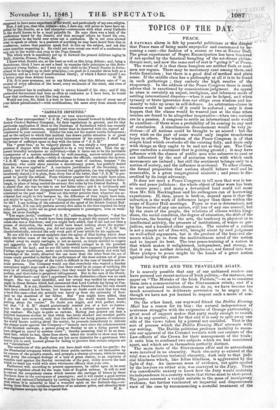TOPICS OF THE D
PEACE.
A NATURAL alarm is felt by peaceful politicians at iliet ditlithr that Peace runs of being made unpopular and contemmed by be- coming a cant—the fashion of a season or two at Exeter Hall. The great experiment of Negro Emancipation has been hindered if not spoiled by the fanatical bungling of the soi-disant philan- thropic sect; and now the same sort of sect is "going it" at Peace. The worst of it is that these bunglers are neither fools or mad- men nor rogues. There may be mercenary cant among them, and feeble fanaticism ; but there is a good deal of method and plain sense. If the middle class has a philosophy at all it is to be found in such gatherings ; they embody the high resolve of the shopocracy. In the address of the Peace Congress there is much advice that is sanctioned by conscientious judgment. An appeal to arms is certainly an unjust, irreligious, and inhuman mode of settling international disputes—when it can be helped, and when tyranny or brute ignorance does not oblige even wisdom and hu- manity to take up arms in self-defence. An arbitration-clause in treaties would be useful—if it could be enforced ; only it does happen that the clause would be wanted just at the time when treaties are found to be altogether inoperative—when two nations are in a passion. A congress to settle an international code would be excellent—if there were a probability of its coming to any sort of conclusion. A simultaneous disarmament would be very ju- dicious—if all nations could be brought to an accord : but the very wish on the part of some would only inspire treacherous hopes in others. The wisdom of the Peace Congress is of that simple kind which overlooks all the existing folly, and deals only with things as they ought to be and not as they are. The Con.. gress embodies a sentiment that is gaining ground ; it may have influence with the classes of public men who subserve to cant or are influenced by the sort of sectarian views with which such movements are imbued ; but still the sentiment belongs only to a section of society, and the influence is sectional. To other classes,. the formal proposition that nations should behave well and be reasonable, is a great congregrated niaiserie ; and peace is die-. credited by its inept advocacy. It does not need a Peace Congress to tell men that war is ter- rible and peace judicious : the whole object of later wars has been to secure peace ; and many a devastated land could tell more than Mr. Silk Buckingham and his colleagues can of harrowing experiences. If, then, peace is broken, depend upon it that the infraction is the work of influences larger than those within the scope of Exeter Hall meetings. Peace or war is determined, not by the resolve of any one nation, still less of any one council, but by the state of the people, the relations of classes within king- doms, the social condition, the degree of education, the drift of the literature, the bearing of the arts, the tendency to physical or to intellectual activity, the pressure of institutions, of wants or pre- judices, and a hundred other agencies. The resolve of a nation is not a simple act of free-will, brought about by cool judgment on well-sifted arguments, but is the product of the hundred ele- ments which go to form the multitudinous mind of the nation and to impart its bent. The true peace-training of a nation is that which makes it enlightened, independent, and strong, so that it can be neither deluded, frightened, nor forced into war. Mere pledges to peace might tie the hands of a great nation against keeping the peace.


























 Previous page
Previous page